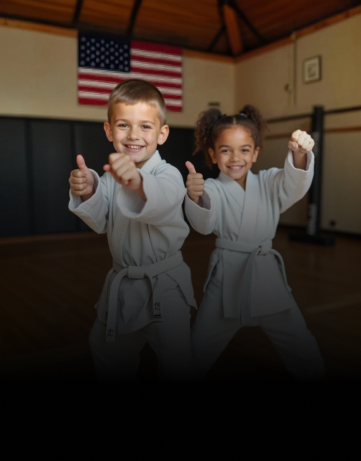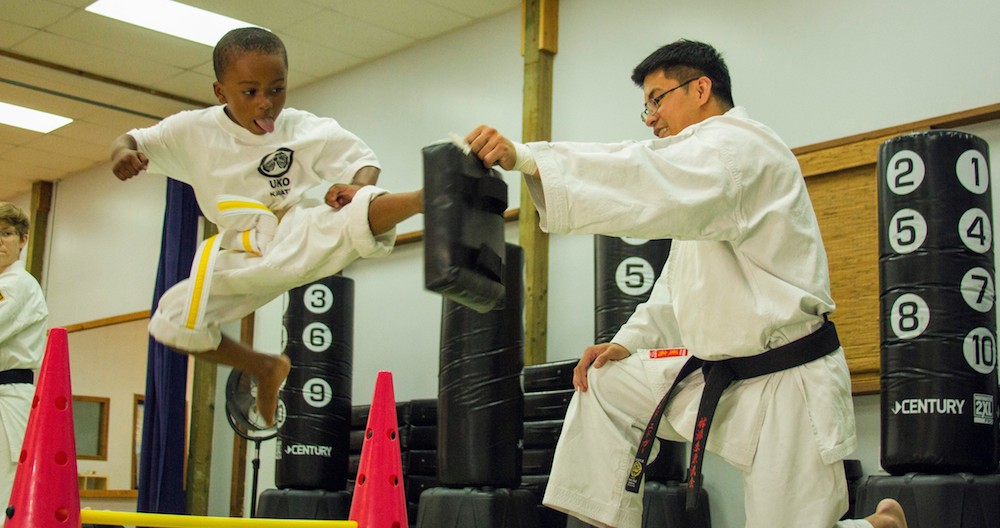Legacy Martial Arts – Experience the Legacy of Tradition in Youth Martial Arts
Legacy Martial Arts – Experience the Legacy of Tradition in Youth Martial Arts
Blog Article
Exactly How Martial Arts for Kids Can Increase Self-confidence and Self-control in Youthful Martial Artists
Karate for children provides a special opportunity to develop self-confidence and discipline in young martial artists. As they find out brand-new techniques and face difficulties, they not just gain skills however additionally develop a strong sense of self-regard. This organized environment motivates them to value the trip of improvement. But exactly how does this training convert right into their day-to-day lives? Discover the much deeper links that make karate greater than just a sport.
The Importance of Self-confidence in Childhood Years Development
Confidence is a vital structure block in youth growth. When you support your youngster's self-worth, you encourage them to encounter obstacles, take threats, and share themselves openly. Children with self-confidence are a lot more happy to check out new tasks and social scenarios, which can bring about lasting friendships and important experiences.Encouraging your kid to step out of their convenience area promotes durability. They learn that failure isn't completion yet instead a tipping stone to success. By celebrating their achievements, regardless of just how little, you assist them acknowledge their capabilities and worth.In this journey, assistance and favorable reinforcement from you play an important role. Whether it's via praise or merely being present, your participation enhances their self-confidence. As they grow, this confidence ends up being a lifelong property, outfitting them to navigate both challenges and possibilities with a strong feeling of self.
Exactly How Karate Educates Self-control and Focus
Martial arts assists you construct technique and emphasis through its organized training program. As you practice mindfulness throughout each session, you'll learn to focus better both on and off the mat. And also, setting and accomplishing goals in martial arts reinforces your capacity to stay committed and conscientious.
Structured Training Routine
While you participate in karate training, you'll promptly discover just how a structured routine imparts technique and focus in young experts. Each class adheres to a particular layout, including workouts, technique practice, and sparring. This uniformity instructs you to devote and appreciate the procedure to improvement. As you discover strategies and forms, you develop a sense of duty for your own progress.The organized setting encourages you to set objectives, whether understanding a new belt or improving a kata. You'll find that staying concentrated throughout drills and classes hones your focus. The technique you grow in karate prolongs past the dojo, favorably influencing your schoolwork and daily routines. Each session strengthens the relevance of dedication, helping you turn into an extra disciplined individual.
Mindfulness in Method
As you practice martial arts, you'll discover that mindfulness comes to be a crucial part of your training. Each move requires your full attention, helping you stay focused on the present moment. You'll learn to ignore diversions and focus on your breathing, movements, and intents. This heightened understanding hones your reflexes and improves your discipline.During sparring or types, you'll find the relevance of being mentally existing - Karate Salisbury MD. You'll discover just how this focus not only improves your method however likewise develops your confidence. By practicing mindfulness in martial arts, you grow persistence and durability, essential traits that expand past the dojo. By doing this, karate instructs you to harness your mind, helping you create a self-displined strategy to obstacles both on and off the floor covering

Personal Goal Setting Techniques
Setting objectives in karate isn't almost making belts; it's an effective method to grow discipline and emphasis. When you set certain, achievable targets, you produce a roadmap for your progression. Instead of simply intending to improve your kicks, attempt concentrating on mastering a specific strategy each month. This approach keeps you inspired and engaged.Breaking down bigger goals right into smaller sized, manageable steps assists you track your progression and commemorate small success in the process. Whether it's perfecting your stance or boosting your sparring endurance, every objective reinforces your commitment. As you accomplish these goals, you'll develop self-confidence in your abilities and establish a solid feeling of discipline that expands beyond the dojo into day-to-day life.
Building Durability With Martial Arts
Fighting style, specifically karate, offers kids a distinct chance to develop strength in a supportive environment. In classes, they face challenges that push their limits, whether it's sparring or mastering a new technique with a companion. Each trouble, like a missed out on kick or a shed suit, comes to be an opportunity to find out and grow.As they practice, kids learn to embrace pain and maintain trying, even linked here when things obtain challenging. They uncover that failing isn't the end; it belongs to the journey. This attitude assists them get better stronger, not simply in the dojo, yet in daily life.With each difficulty they conquer, your child builds confidence in their capacity to deal with challenges, sustaining their resolution. With karate, they'll recognize that durability isn't practically physical toughness; it's concerning mental grit and perseverance, encouraging them to deal with whatever life throws their means.
The Function of Respect in Martial Arts Training
Respect is a fundamental principle in karate training, cultivating a culture of discipline and friendship amongst students. When you tip onto the dojo flooring, you're not just discovering strategies; you're also learning to appreciate your instructors, peers, and the art itself (Karate Salisbury MD). Bowing at the beginning and end of class isn't simply a formality; it signifies your acknowledgment of others' initiatives and dedication.As you develop shared regard, you'll discover it boosts your discovering experience. You'll listen a these details lot more attentively to your teacher and gain insights from fellow trainees. This setting motivates positive criticism and assistance, permitting everyone to expand together.Moreover, respect grows self-control. Recognizing the worth of effort and humbleness aids you stay concentrated on your training. In turn, this regard converts into your daily life, boosting your communications and relationships outside the dojo. With martial arts, you discover that regard is essential for personal growth and area structure
Setting Goals and Accomplishing Success in Karate

Social Skills and Teamwork in the Dojo
While training in the dojo, children normally establish vital social skills and synergy capacities. As they exercise together with peers, they learn to connect properly, share area, and support each other. Each course presents chances for partnership, whether it's throughout companion drills or group workouts. This team effort fosters relationships and produces a feeling of belonging, making the dojo a nurturing environment.Kids likewise acquire valuable problem resolution skills. When they encounter obstacles, such as differences during sparring, they discover to navigate these scenarios constructively. They practice perseverance and empathy, understanding that everybody has different staminas and weaknesses.Moreover, joining team activities grows a feeling of responsibility. You'll see your child finding out to rely upon colleagues and take duty for their function in a team. These experiences not only improve their martial arts journey yet likewise outfit them with social tools they'll bring right into other locations of life.

The Long-Term Perks of Martial Arts Beyond Childhood
As youngsters expand up and change into adulthood, the advantages of martial arts expand far beyond the dojo. You'll discover that the technique and emphasis learned through karate can equate right into your scholastic and professional life. Establishing and accomplishing objectives in fighting styles promotes a strong work principles, which can push you to master any type of endeavor.Moreover, the self-confidence obtained from competing and understanding strategies can boost your self-esteem, helping you tackle challenges head-on. This durability ends up being vital as you deal with the unpredictabilities of adulthood.Additionally, internet the social abilities established with team effort and sociability in the dojo can bring about far better partnerships in both expert and personal spheres. You'll learn to communicate effectively, willpower problems, and construct an encouraging network.Ultimately, karate forms not just proficient martial musicians, but all-round individuals ready to handle the globe.
Often Asked Concerns
What Age Is Best to Beginning Martial Arts for Kids?
You can start martial arts as very early as age four or 5, however it commonly relies on your kid's maturity and rate of interest. Finding a course that fits their age and energy degree makes a huge difference.
Exist Any Type Of Health And Wellness Benefits From Exercising Karate?
Yes, practicing karate deals various wellness advantages. You'll improve your toughness, versatility, and coordination while boosting cardiovascular fitness. Plus, it boosts focus and psychological well-being, making it a superb selection for total physical and psychological wellness.
Exactly How Frequently Should Youngsters Attend Karate Courses?
You should encourage your children to attend karate classes at the very least a couple of times a week. Uniformity helps them discover strategies effectively and establish abilities, making their experience more pleasurable and fulfilling in the future.
Can Karate Assist With Handling Anxiousness in Children?
Yes, karate can assist handle anxiousness in children. It instructs emphasis and self-constraint while providing a safe outlet for energy. You'll observe your youngster expanding more confident and calm as they exercise regularly.
What Gear Is Needed for Kids Starting Karate?

Report this page